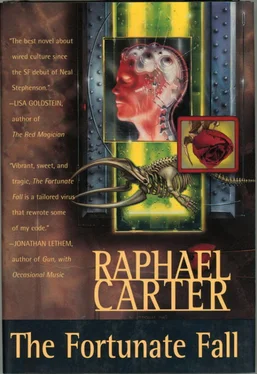Raphael Carter - The Fortunate Fall
Здесь есть возможность читать онлайн «Raphael Carter - The Fortunate Fall» весь текст электронной книги совершенно бесплатно (целиком полную версию без сокращений). В некоторых случаях можно слушать аудио, скачать через торрент в формате fb2 и присутствует краткое содержание. Город: New York, Год выпуска: 1996, ISBN: 1996, Издательство: Tor Books, Жанр: Киберпанк, на английском языке. Описание произведения, (предисловие) а так же отзывы посетителей доступны на портале библиотеки ЛибКат.
- Название:The Fortunate Fall
- Автор:
- Издательство:Tor Books
- Жанр:
- Год:1996
- Город:New York
- ISBN:0-312-86034-X
- Рейтинг книги:3 / 5. Голосов: 1
-
Избранное:Добавить в избранное
- Отзывы:
-
Ваша оценка:
- 60
- 1
- 2
- 3
- 4
- 5
The Fortunate Fall: краткое содержание, описание и аннотация
Предлагаем к чтению аннотацию, описание, краткое содержание или предисловие (зависит от того, что написал сам автор книги «The Fortunate Fall»). Если вы не нашли необходимую информацию о книге — напишите в комментариях, мы постараемся отыскать её.
“Gripping…. One of the most promising SF debuts in recent years”.
—“Publisher’s Weekly” starred review
The Fortunate Fall — читать онлайн бесплатно полную книгу (весь текст) целиком
Ниже представлен текст книги, разбитый по страницам. Система сохранения места последней прочитанной страницы, позволяет с удобством читать онлайн бесплатно книгу «The Fortunate Fall», без необходимости каждый раз заново искать на чём Вы остановились. Поставьте закладку, и сможете в любой момент перейти на страницу, на которой закончили чтение.
Интервал:
Закладка:
“Relax for gods’ sake!” I called out to them. “Your tribe!” And I laughed as I passed, seeing myself through their eyes: a singing missile, if you could call it singing, that had crashed past and shouted nonsense at them. I knew they were only sharing an umbrella, not kissing as it had seemed. But it was lovely to pretend.
Galuboy —the word came to me suddenly, out of the undiscovered country the encyclopedia suppressed. “Light blue.” How odd; how inappropriate. Like kit, whale, which sounds like a chick’s peeping. But galuboy’s for men; what is it called in women? Well, words would come later. For now, this feeling. My head tingled with the memories it kept in trust, as though it couldn’t hold them back much longer. The Requiem crashed in my head like the stamping of a great beast. Of course, an elephant. Oh, I had been awful to her! Hooks, indeed. But even those remembered insults would be cherished in the end.
I turned around and walked backward a few steps in order to sing another verse to the umbrella women, and as I spun back again, my coat fell open. I had lost the belt somewhere, probably in the hedge. There was no time to retrieve it, so I held the coat shut by crossing my arms and gripping each epaulette in the opposite hand. Just you give me a crook and flail, and I’ll adorn you a sarcophagus, or lie on an African moistdisk in hologram gold.
The trail started to meander unproductively, so I splashed onto the grass, refusing to divert my path even for the deepest puddles. And so, butchering the Tuba mirum, I climbed and crested a low hill, and saw a man in a black suit leaning against a tree ahead of me. I stopped singing, reduced my pace, and changed course slightly to avoid him. I had almost passed him, and was half-convinced my fears were wrong, when he called out, “Do you know the time, tavarishcha?”
“Ask the Net!” I shouted, and looked back over my shoulder at him. He had turned his head, showing me a black slab of moist-ware set flush with his skull, like those sunken tombstones you can mow right over.
“Please put your hands in the air where they are clearly visible,” the Postcop called out.
I did.
“Thank you, tavarishcha. Now please reach down very slowly and remove first your Net chip, then all other enhancements except for your encyclopedia.”
Again I complied, fumbling with the babushka. Yes, quite an enhancement, that encyclopedia.
“You see it is much better to cooperate. Now, if you would, please place your hands behind your head and lie on the ground with your face down.”
I dropped to my knees and then, because I couldn’t use my hands to catch myself, fell forward awkwardly onto the wet grass. My face was in a puddle, so I had to close my eyes and hold my breath. For a moment no one came, and I vainly hoped that I would be allowed to lie there in the grass until the rain dissolved me. It was a hard, sharp rain that would leave no skeleton.
Then my arms were grasped and cuffed, and two sets of hands gently lifted me to my feet. My face and clothes were covered with mud, and I noticed that the Postcops that were flanking me wore rubber gloves.
As we walked to the van I began to think again, a little, and realized that they would not have known where to ambush me unless they had been listening in on my conversation with Keishi. In that case, they must know everything. The rain would not dissolve me—in fact, I realized as they loaded me into the back of the windowless van, I might never see rain again; and I turned to see the sky one last time, only to have my head pushed firmly down.
As the van drove through the streets of Leningrad, the rain besieged it, crashing against the metal, clawing the roof with its nails, howling as a wolf howls when torn from her pups or her prey. It could not get to me. No, it would not be the rain. But I had gotten what I’d wished for. I was dead.
Fourteen
TEA AND SYMPATHY
After three hours of interrogation, I finally cracked.
“No!” I screamed. “For the hundredth time, I do not want any more fucking crumpets! And get that teapot out of my face.”
The young man across the table set down the little delftware teapot and put on a face of disappointed concern. “I am sorry that our hospitality is not to your liking. We had very little notice of your arrival. If there is something we can remedy, by all means—”
“I’ve told you a dozen times. I want these handcuffs off. And I want to go to the bathroom.”
Officer Rubatin turned to his partner and said in a conciliatory tone, “They seem reasonable enough requests, Officer Ignateva.”
The woman with the sergeant’s bars pressed her thin lips together. “The manner in which they were delivered was anything but reasonable. Such a tone is inappropriate in this environment, and her use of profanity denotes a person unable to control her passions as society requires.”
“Ohhhhhh, I get it now,” I said to the woman. “You’re the bad cop and he’s the good cop. You know how I can tell? Because you whisper louder.”
“Plainly we are getting nowhere,” Good Cop said. “Perhaps if we remove the restraints, as a gesture of goodwill, she will recognize our peaceable intentions.”
“Very well, Officer Rubatin,” Bad Cop said, scowling. “I trust that our good-naturedness will not be met with more hostility.” She nodded to Good Cop, who moved around the table to remove the cuffs.
“Um, actually,” I said, “the bathroom thing is a little more urgent right now.”
Bad Cop was incredulous. “We give you one thing and you instantly demand another?”
“Oh, no. No, by all means, please remove the cuffs, that’s fine. I thank you profoundly for the favor.” My wrists were starting to go ominously numb, so I didn’t want to lose the chance to free them, even though my bladder had been a dull ache for most of the last hour. I had drunk one cup of tea to keep my strength up for the interrogation, and a second cup because it really was excellent tea, and a third because the sips gave me a chance to think before I answered. Now I was paying the price. I wondered whether I had fallen into the same trap the first time.
I stood so Bad Cop could remove the cuffs, and stayed standing as I rubbed my wrists. It felt good to have them off now, though at first I had been grateful for them. My greatest fear had been that a Weaver would possess one of the Postcops, take out a cable, and mindsuck me. The thought had made my every socket ache, as though fear had given the metal nerves. So I had been glad of the cuffs that locked over my wrist sockets, giving me the illusion that they were protected—two fewer wounds through which I might be hurt.
But they were not going to go Weaver. I was almost certain of that now. A Weaver can be in a hundred places at a time, so what they do, they do quickly. If a Weaver were going to take one of them, she would have done it long before.
I started to sit down, wondering whether they’d let me go expel the tea if I asked very, very nicely. Suddenly I stopped, my knees half-bent, and thought: Postcops. Maya, these are Postcops, and not Weavers. They were ordinary citizens, appropriated for a day; someone had shown up at their doors that morning, ignored the usual excuses, and inserted the Post moistware into their heads. Their behavior was electronically regulated, and, in the areas that mattered most, predictable. They were going to kill me—there was no doubt of that. It would be soon. And no matter what I did, the death would be polite and painless.
To know for certain that you cannot change your fate can be a rather liberating experience. The instant I’d accepted it, I had an idea.
“May I stand a while and stretch my legs, please?” I asked.
Читать дальшеИнтервал:
Закладка:
Похожие книги на «The Fortunate Fall»
Представляем Вашему вниманию похожие книги на «The Fortunate Fall» списком для выбора. Мы отобрали схожую по названию и смыслу литературу в надежде предоставить читателям больше вариантов отыскать новые, интересные, ещё непрочитанные произведения.
Обсуждение, отзывы о книге «The Fortunate Fall» и просто собственные мнения читателей. Оставьте ваши комментарии, напишите, что Вы думаете о произведении, его смысле или главных героях. Укажите что конкретно понравилось, а что нет, и почему Вы так считаете.












